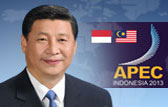
Shanghai, Hamburg use history to forge future
Updated: 2013-11-28 07:19
By Wang Hongyi in Shanghai (China Daily)
Comments Print Mail Large Medium Small
Two cities draw on each other's resources to renew their friendship.
You would be hard-pressed to find a more identical pair of non-identical twins. On one side is Shanghai, straddling the mighty Huangpu River, which acts as one of its chief economic arteries. On the other side is Hamburg, sitting astride the Elbe, which acts similarly for the German port city.
Shanghai is now reveling in worldwide attention as it goes about setting up a free trade zone, and the German city glories in its official title, the Free and Hanseatic City of Hamburg, commemorating among other things its place in a powerful trading bloc of the late Middle Ages.
The two metropolises, which have officially been twin cities for more than 27 years, also rank in one way or another as their respective countries' second-largest cities.
And they have at least one other thing in common: Both have brains. As a result, a large part of the twin-city agreement that the pair signed in 1986 is concerned with education. That aspect of the relationship is about to get a fresh injection with work that universities in both cities are doing together.
Fudan University in Shanghai says more academic research into Sino-German history, culture and society is likely to be carried over the next five years in conjunction with the University of Hamburg.
Under a program supported by Hanban, the Confucius Institute headquarters, five doctoral students from the University of Hamburg will spend one year studying Sinology at Fudan University next year, said Dr Zhang Ke, an assistant professor at Fudan University.
This month the second Shanghai-Hamburg Forum was held at the University of Hamburg, with the theme China in Germany: Education, Media, Culture and Urban Planning.
The forum emphasized the importance of the two sides working closely together, and organizers said lectures and discussions illustrated how China and Germany have influenced each other on the basis of economics.
The forum was named after Gottfried Wilhelm Leibniz (1646-1716), one of the greatest German mathematicians and philosophers.
Juergen Bruns-Berentelg, head of urban planning for HafenCity Hamburg GbmH, which is owned by the city of Hamburg, demonstrated how a new quarter built in the city aims to combine living space, working space and environmental sustainability.
The next two Shanghai-Hamburg Forums are to be held in Shanghai in April 2015 and in Hamburg the following October.
(China Daily 11/28/2013 page6)






